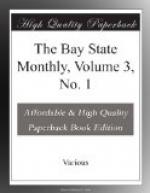CHAPTER XVI
THE DINNER PARTY.
Colonel Archdale with his hands behind him walked up and down his drawing-room in pleasant anticipation, with, it may be, a touch of the feeling which once animated an Eastern monarch over the great city that he had builded for the honor of his name. The Colonel had been like the monarch in one thing, that he had been born in wealth, not obliged to start at the very beginning of the race; he was like him in this also that he had made the very best of material opportunities; he had builded about himself, if not a great city, at least a great and profitable business, so that he had a reasonable expectation of leaving his son and his two surviving daughters—the latter still children—wealthier than his father had left him. The only drawback, and he had not yet found it a serious one, was that it was difficult to take as much money out of his profits as he would have liked to live upon, for his increasing business demanded always increasing capital. Also, he had done a great deal for Stephen, so that it required all his efforts to maintain the splendor in which he lived, outdoing his associates. All things considered, therefore, it was not so very strange that he should have resembled Nebuchadnezzar in the other respect of satisfaction in his own achievements. That day the cream of the society of Portsmouth and its neighborhood were to be at his house; most of them, without doubt, pleased to be invited. Peace and plenty were here. The war three thousand miles away, in which the brave young queen Maria Theresa was struggling for her inheritance, had just rolled a tidal wave across the Atlantic, and the news of the garrison taken from the English fort of Canso and carried prisoners to Louisburg had just reached Boston. This capture had been made before the Colonies had learned that war had been declared by France against Great Britain. Already there were signs of hostility among the Indians, and a movement of whole tribes toward Canada to join the French, whose old allies they were.




